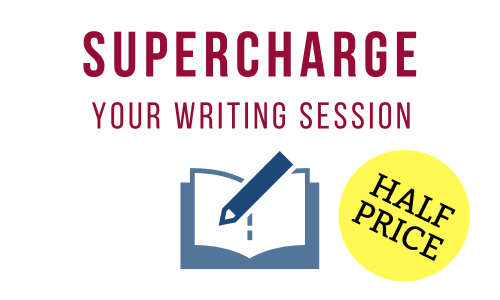This week's Spotlight is for Supercharge Your Writing Session. Get it for
just
$4 until the end of this Friday (30th May) with the discount code writingroutine.
Is your
current writing routine working well for you?
Even if you're doing the same things that were working last year, or even last month, you might find that they're no longer quite the right fit for you.
Here are four signs it might be time to change up your writing routine:
#1: Your Writing Time Feels Like a Chore
Do you find yourself often sitting down to write, feeling like it's just another thing on your to-do list?
We all have days when we
have to push through ... but if your writing time feels like a chore (or even a punishment!) rather than something you mostly look forward to, then your current writing routine probably isn't quite working for you.
Change It:
- If you're writing daily, try writing for longer sessions a couple of times a
week. Hopefully, that will feel more like a treat and less like a chore.
- If you've forced yourself into someone else's writing process, go off-piste! It's okay to start writing without an outline, to jump around between scenes in different parts of the story, or to edit each chapter before you move on.
#2:
You're Not Making the Progress You Want to See
We're almost five months into 2025 ... have you made as much writing progress as you wanted? If you haven't, then it may be time to think of a new writing routine.
While individual weeks can easily go awry, if you're
consistently not getting much writing done month after month, then your routine probably needs an overhaul.
Change It:
- Be realistic about the time you'd need to put in to get the results you want. E.g. if you're currently writing 1,000 words/week and you want to write 3,000/week, you need to block out
three times as long to write.
- Think about when you typically write during the day. If you feel like you're slow and distractable, perhaps you'd be more energetic and focused at a different time of day.
#3: You're Ending One Project and Starting Another
Even if your writing routine's been going well, it's always worth having a think about changes if you're finishing one project and starting another ... or even moving on to a different stage of the same project.
Perhaps you've just finished a novel and you're brainstorming the next one. Maybe you've been working on
a few short stories but now you're going back to edit the novel you drafted last year. Whatever the situation, the routine that worked previously may not be quite right.
Change It:
- Think about what might work best for the new project. Perhaps short daily sessions of brainstorming would suit you better
than two-hour slots ... or vice versa.
- Give yourself the opportunity to experiment. Try changing where you write, for instance, or exploring a "getting started" ritual for your writing time.
#4: Your Life Circumstances Are Changing
Sometimes, your writing routine needs to shift because another area of your life is changing. You might be starting a new job with different hours, moving house, adding a member to your family, waving your youngest child off to university, or taking on caring responsibilities.
Whether the change means more time overall, less time, or
just a different schedule, there's a good chance it's going to impact on your current writing routine.
Change It:
- Try planning out writing slots into your week: where might it make sense to fit these in? Your writing slots could be anything from 15 minutes to several hours, though I find that slots of
30 minutes to 2 hours work best.
- Look for ways to make writing a priority, despite other changes: it's important to you and you deserve that writing time, however busy things are. You might need to enlist help from others (e.g. trading off parenting duties with your partner).
The great thing about writing is that
you can do it pretty much anytime, anywhere! If your current writing routine doesn't work as well as you'd like, there's bound to be something else you can try.
Happy writing,
Ali
P.S. If you missed last week's blog post, you can find it here:
What is an Epistolary Novel? Pros, Cons, and Examples of Epistolary Fiction

